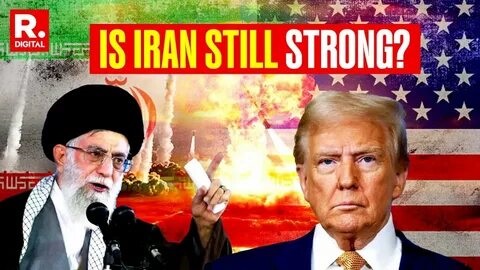
On February 4 morning, a black swan appeared in the White House, even as President Donald Trump signed a National Security Presidential Memorandum (NSPM) restoring “maximum pressure” on Iran, denying that country “all paths to a nuclear weapon” and outlining a tough policy posture toward Tehran, notes M.K. Bhadrakumar, Indian Ambassador and prominent international observer.
And the mother of all surprises was that the NSPM document as such studiously avoided any threat of war against Iran. Trump avoids anti-Iran rhetoric lately, which used to be a running feature of his first term as president. Although a mercurial personality, Trump is not tweaking, either, the complex web of unwritten ground rules and norms of conduct that kept the four decades-old US-Iran standoff from turning into military confrontation (something which, of course, neither side wants).
Meanwhile, all indications are that Trump senses that the Iran question has transformed as Tehran’s deterrent capability began surging in recent years, and is no longer a ‘stand-alone’ challenge for the US, as the external environment too has changed phenomenally and works in Tehran’s favour since the Ukraine war began.
For instance, Russia and Iran are in a quasi-alliance today. That said, Russia is also a stakeholder in nuclear non-proliferation and also has a congruence of interests with the US that Iran abides by the NPT. Again, the China-brokered Iran-Saudi rapprochement has dramatically changed the alignments in the region both bilaterally as well as regionally. Simply put, containment of Iran has become an obsolete strategy.
Even otherwise, a sense of proportions is always necessary to assess the US-Iran tensions. Therefore, Trump’s remarks on Tuesday after signing the executive order on NSPM need to be properly understood. Suffice to say, It was a carefully choreographed performance by Trump, caught on camera, and one of those rarest of rare occasions, speaking with an eye on the prompter — rather unusual for Trump who is famous for his stream of consciousness.
Trump spoke calmly in a measured tone — even sombre tone. He noted stoically, “We could have a Middle East and a world in total peace. Right now, we don’t have that. I like to have peace all over the world but now you have the world blowing up.”
When asked by a journalist what kind of a deal is envisaged with Iran, Trump replied, “We will see. They (cannot) have a nuclear weapon. With me, it is simple: Iran cannot have a nuclear weapon. We don’t want to be tough on Iran… This (deal) could have been done long ago.”
In essence, Trump conveyed a nuanced message to Tehran before Netanyahu’s arrival that he has an independent line of thinking regardless of what the hotheads in Tel Aviv might be saying. And that is to work for a deal through smart diplomacy — the JD Vance line.
Trump understands that the Masoud Pezeshkian government also seeks dialogue and negotiations. Trump does not believe that Iran is on a course to develop nuclear weapons, no matter the decade-old propaganda by the pro-Israel interest groups to malign Iran.
Tehran has rich experience in ‘smart diplomacy’. Quite obviously, the NSPM document is for record, given the reality of a powerful pro-Israel lobby in the US which also happens to be a core constituency in the American political system, including within the Republican Party. With his remarks, Trump endeavoured a soft landing for NSPM on the diplomatic arena.
Tehran will grasp Trump’s nuanced message of ‘transactional geopolitics’. Iranian officials have welcomed Trump’s remark that he is willing to work out a deal. Foreign Minister Abbas Araghchi wrote in a message on Wednesday: “In addition to being one of the committed parties to the NPT and other global non-proliferation treaties, Iran has already explicitly declared that ‘Iran will not seek to produce or acquire nuclear weapons under any circumstances’.”
Araghchi proposed as conclusion: “Obtaining practical guarantees that Iran will not attain nuclear weapons is not difficult, provided that, in return, concrete assurances are given to effectively end hostile actions against Iran—including economic pressures and sanctions.”
Tehran has taken note that Trump did not rule out a meeting with Pezeshkian. When asked about Trump’s remark, the government spokeswoman Fatemeh Mohajerani told reporters at a press conference in Tehran on Wednesday, “Our international issues have been founded upon the principles of dignity, wisdom and expediency. All issues, specifically relations with other countries, are being pursued on the basis of these three principles.”
In effect, decoding the highly refined Persian idiom, Iran has responded positively to Trump’s estimation that a deal is possible and signalled flexibility, moderation and pragmatism on its part. The AP has picked up the trend and US government-funded PBS lost no time to flash the news.
The region too has been quick to sense the shift of tectonic plates. In an interview with Fox News, Trump’s favourite channel, Qatari foreign ministry has promptly offered to play a mediatory role between Washington and Tehran.
read more in our Telegram-channel https://t.me/The_International_Affairs

 10:23 09.02.2025 •
10:23 09.02.2025 •






















